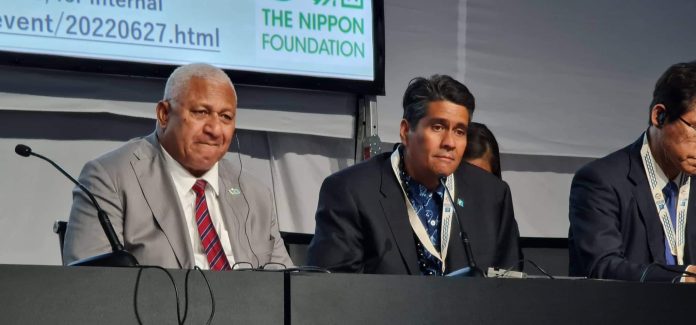By Pita Ligaiula in Lisbon, Portugal
Pacific leaders attending the 2022 UN Ocean Conferences this week heard that ‘Marine and coastal ecosystems’ are the most threatened in the world.
Speaking at the “Managing, protecting, conserving and restoring marine and coastal ecosystems” discussion, Fijian Prime Minister and Chair of the Pacific Islands Forum said the region has experienced climate change, pollution and biodiversity loss with a severity that rivals war.
Bainimarama said that only four percent of the Pacific territory is land — and that the rest is ocean.
He explained the goal to protect 30 percent of the ocean offers a huge opportunity to develop domestic blue economies.
Bainimarama said he is excited about the future and called for a new way of thinking that is centred on people and nature.
“By the time we leave Lisbon, we need the world with us,” he stressed.
Speaking for the Pacific Small Island Developing States (PSIDS),Vanuatu Climate Change Minister Silas Bule said the Pacific region is home to the world’s largest tuna population, and by far remains among the best managed fisheries.
“Its success is based on a long history of managing coastal resources through strong marine protected area approaches, whereby traditional concepts have been translated into modern protection efforts.
“This is but one example of how the traditional knowledge of indigenous peoples and local communities can inform actions to conserve and restore ecosystems, especially mangroves, sea grass and coral reefs.
He also called for strong practical action for species protection.
Co-Chair of the Friends of Ocean Action and Former Deputy Prime Minister of Sweden, Isabella Lövin, who moderated the discussion said “Without political will, we will not make it”.
Meanwhile, Fijian Prime Minister Frank Bainimarama said that small island developing States cannot choose between preserving marine ecosystems and developing an ocean economy.
Bainimarama said the two can go hand in hand by finding a responsible balance between growth, social inclusion, livelihoods and nature protection.
“Countries can create a sustainable blue income stream that injects funds directly into their societies, helping to rebuild after disasters and boosting climate resilience.
“We know this because we do this,” he said.
Bainimarama also expressed regret that Goal 14 is the least funded and that there are no markets for carbon sequestration or coastal protection.
Tongan Prime Minister, Siaosi Sovaleni said that full recognition of the special needs of small island developing States, particularly those in the Pacific, would go a long way towards strengthening the development of sustainable ocean-based economies.
“The achievement of target 14.7 of the 2030 Agenda must include the sustainable management of fisheries, aquaculture and tourism, which requires detailed knowledge of the specific requirements of island nations” said PM Sovaleni.
SOURCE: PACNEWS














